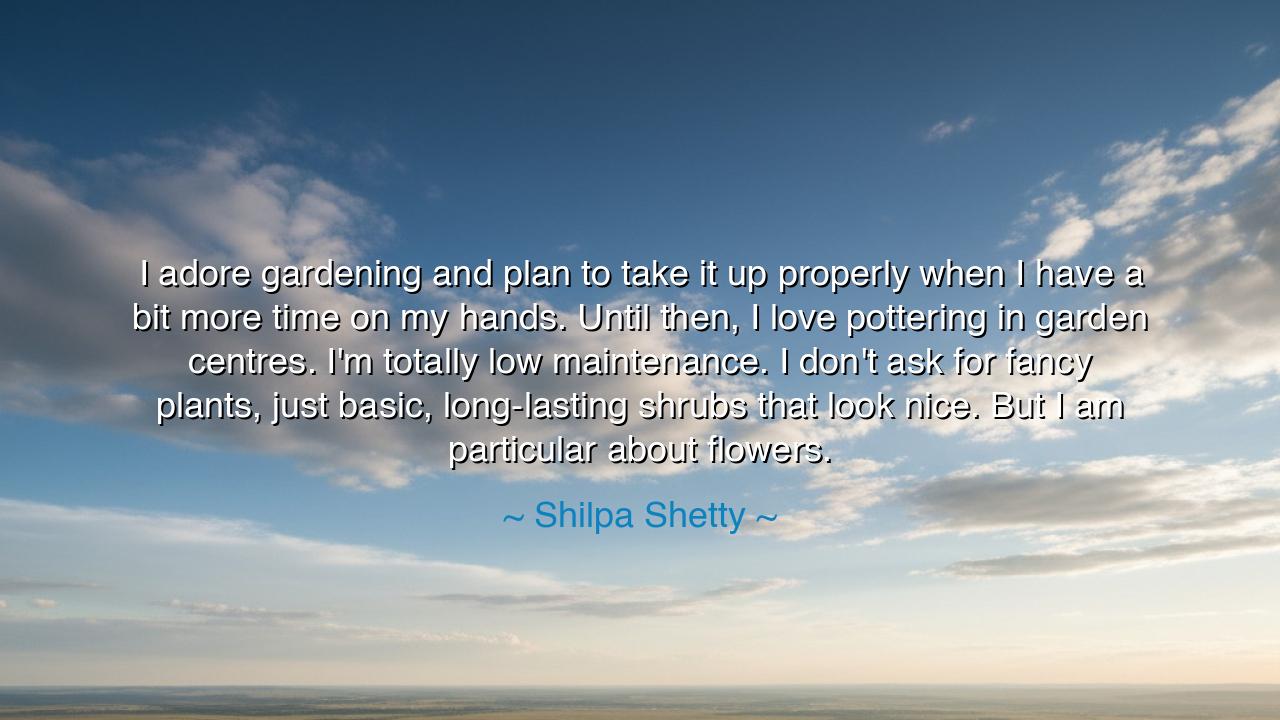
I adore gardening and plan to take it up properly when I have a
I adore gardening and plan to take it up properly when I have a bit more time on my hands. Until then, I love pottering in garden centres. I'm totally low maintenance. I don't ask for fancy plants, just basic, long-lasting shrubs that look nice. But I am particular about flowers.






“I adore gardening and plan to take it up properly when I have a bit more time on my hands. Until then, I love pottering in garden centres. I'm totally low maintenance. I don't ask for fancy plants, just basic, long-lasting shrubs that look nice. But I am particular about flowers.” — in these warm and unpretentious words, Shilpa Shetty, the actress and entrepreneur, reveals a philosophy of life that is both humble and profound. Beneath her talk of gardening, shrubs, and flowers lies a reflection on balance — between ambition and simplicity, between beauty and endurance, between the longing for perfection and the acceptance of time’s gentle pace. Hers is not merely a statement about plants, but about living: to care, to wait, to find joy in small things, and to know that what endures is often what is most ordinary.
The origin of this quote arises from Shetty’s reflections on her life beyond fame — her desire for calm amidst the whirl of work, family, and public life. Though she is known for her grace and glamour, here she speaks as one grounded in earth and time. Gardening, for her, represents the dream of a slower life, a return to patience and touch. She longs to “take it up properly,” yet even now finds joy in wandering through garden centres, admiring the promise of life in every pot and petal. There is a sweetness in her admission — a reminder that love for something need not be perfect to be true. Even when time is scarce, affection finds its expression.
To say she prefers “basic, long-lasting shrubs” over fancy plants is to express an ancient wisdom: that true beauty lies not in extravagance but in endurance. In a world dazzled by novelty, Shetty’s words call us back to constancy — to that which survives season after season, rooted and steady. The shrub, humble though it may seem, symbolizes quiet strength. It does not wither in neglect nor demand too much to thrive; it stands, year after year, clothed in quiet green. And yet, she says, she is “particular about flowers.” This reveals not contradiction but harmony — for while she values simplicity, she still honors the artistry of color and form. Even in modesty, she makes space for beauty.
The ancients would have understood her perfectly. For even the philosophers of Greece and India spoke of balance — the middle path between indulgence and deprivation. Epicurus, though often misunderstood as a lover of pleasure, taught that true joy lies in moderation, in finding delight in what is sufficient. Likewise, the Bhagavad Gita teaches the art of measured living — to act without excess, to work without attachment, to love without vanity. In tending her shrubs and admiring her flowers, Shetty reflects this same truth: that a life of grace is one that honors both usefulness and beauty, both constancy and wonder.
We see this harmony mirrored in history’s great lives. Consider Mahatma Gandhi, who, though he walked the path of simplicity, found joy in tending the ashram gardens. The humble act of watering and pruning became for him a form of meditation — an exercise in humility, patience, and mindfulness. Each plant, he said, taught him the law of cause and effect: that care brings life, neglect brings decay, and every seed, when nurtured, carries the potential for transformation. So too, Shilpa Shetty’s delight in gardening is not escapism; it is her recognition that tending to life, however small, restores order to the heart.
There is also a quiet honesty in her acknowledgment of time — “when I have a bit more time on my hands.” In this, she reminds us of a truth we often forget: that passion and patience must walk together. There are seasons in life when the garden cannot yet be fully tended — when work, family, or duty call us elsewhere. But even then, we may “potter” in the garden centres of our dreams, keeping the spark alive until time allows for devotion. This, too, is a lesson: to accept the limitations of the moment without losing sight of joy. To love something imperfectly now, rather than wait for perfect conditions that may never come.
In her simple, earthy words, Shetty teaches that beauty is not in the grand or the rare, but in the enduring and the attentive. The long-lasting shrub is the heart’s steadiness; the flower is the soul’s delight. The garden is life itself — demanding patience, forgiving mistakes, rewarding effort, and always, always returning to growth.
So, my child, take this wisdom to heart: live as a gardener lives. Do not chase the exotic or the fleeting; plant what lasts. Tend to what you can today, and let the rest wait for its season. Be low maintenance in your desires but particular in your loves — for love, like a flower, is precious precisely because it is delicate. Wander through your own “garden centres,” real or imagined, and let your heart bloom with gratitude for what is already growing.
For as Shilpa Shetty reminds us, the soul does not need grandeur to feel joy — only time, patience, and a patch of life to care for. And when at last the flowers bloom, whether in your garden or your spirit, you will understand that the simplest beauty, tended with love, is the one that endures forever.






AAdministratorAdministrator
Welcome, honored guests. Please leave a comment, we will respond soon